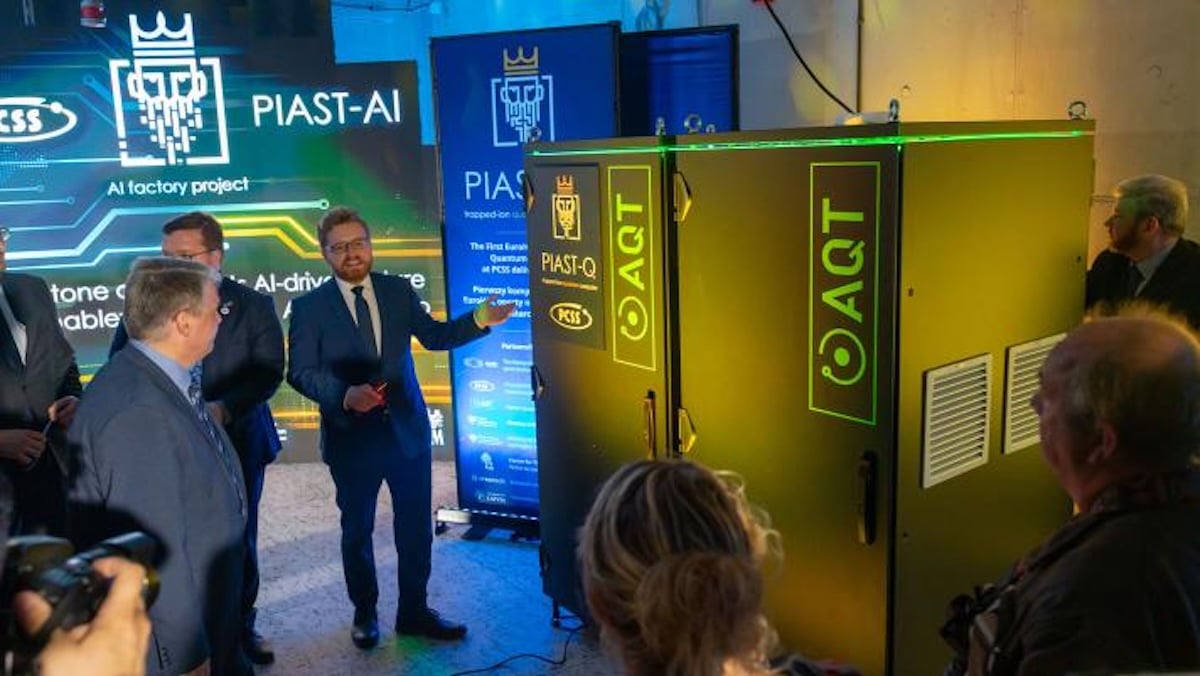Europe has reached a milestone in its digital strategy with the official inauguration of PIAST-Q, the first operational quantum computer of the EuroHPC JU consortium. The event, held at the Poznań Supercomputing and Networking Center (PCSS) in Poland, marks the beginning of a new era for European quantum computing, with a clear focus on technological sovereignty, energy efficiency, and scientific leadership.
A Tribute to History with a Forward-Looking Vision
Named in honor of the Piast dynasty, the first historical royal house of Poland, PIAST-Q is a laser-trapped ion quantum computer developed by AQT (Alpine Quantum Technologies) and hosted at PCSS. With an initial capacity of 20 physical qubits, the system incorporates cutting-edge features:
- High-fidelity universal quantum gates to minimize errors.
- Extended coherence times, allowing for the execution of more complex circuits.
- Full connectivity among qubits, enabling more efficient and stable programming.
Hybrid Computing: Quantum and Traditional
PIAST-Q will not operate in isolation. It will be integrated with traditional high-performance supercomputers, starting with the ALTAIR system and later with PIAST-AI, one of the 13 European artificial intelligence centers (AI Factories) currently in development. This integration will enable hybrid use cases in areas such as quantum optimization, molecular chemistry, materials science, and machine learning.
Although the system is still in the calibration phase, it is expected to be operational for European users by the end of 2025, with open access for academic institutions, industry, and the public sector across Europe.
“The inauguration of PIAST-Q is a decisive step towards the European quantum era,” stated Anders Jensen, CEO of EuroHPC JU. “With this infrastructure, we are not just investing in technology, but in European excellence”.
Clean, Scalable, and Ready-to-Deploy Technology
Unlike other quantum platforms, PIAST-Q operates at room temperature and consumes less than 2 kilowatts of power, eliminating the need for cryogenics, liquid cooling, or complex energy infrastructures. The entire system fits into two standard 19-inch racks, making it easy to integrate into conventional data centers.
This efficiency, combined with its modular and scalable architecture, makes PIAST-Q a pioneering solution for scientific and business applications, with a low barrier to entry and high potential for expansion.
European Funding and International Collaboration
The project has been co-financed by EuroHPC JU and the Polish government, with a total investment of €12.28 million. Half of the cost has been covered by the Polish ministries of Digital Affairs and Science and Higher Education.
The technical management is conducted by the EuroQCS-Poland consortium, led by PCSS and also comprising the Theoretical Physics Center of the Polish Academy of Sciences, the company Creotech Instruments S.A., and the University of Latvia, consolidating a network of scientific collaboration in Eastern Europe.
A European Strategy to Dominate Quantum Computing
PIAST-Q is the first of eight quantum computers acquired by EuroHPC JU, integrating six distinct quantum technologies: trapped ions, superconducting circuits, photonics, neutral atoms, adiabatic systems, and analog simulators. This diversity will create a complementary portfolio of quantum capabilities across Europe.
This initiative is part of the European Union’s strategy to triple its capacity in data centers and advanced computing over the next 5 to 7 years. It includes parallel programs for European chip research, quantum software development, and HPC and quantum talent training, aiming to consolidate a 100% European value chain in next-generation computing.
PCSS’s Role in European Digital Transformation
With over 270 European projects completed in the last three decades, PCSS has established itself as a key player in developing advanced digital infrastructures in Poland and Europe. Its involvement in areas such as cybersecurity, energy efficiency, digital education, HPC, artificial intelligence, and quantum technologies positions it as a strategic node within the European scientific network.
A Firm Step Towards the European Quantum Future
With PIAST-Q, Europe advances toward technological autonomy in a strategic area like quantum computing. This new system not only strengthens the continent’s innovative capacity but also opens the door to a new generation of scientific and industrial applications that will set the pace for the next decade.
The European quantum era now has a name and a starting point: PIAST-Q.
via: eurohpc-ju.europa.eu

